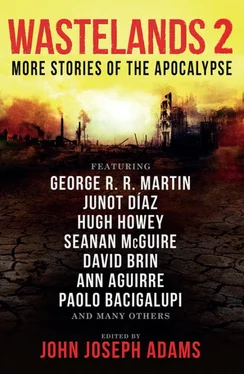“Mr. Mayor!” a woman’s tremulous voice cut in, her words high-pitched with fear as she reached up to grab the bossman’s hand. “P-please… I…”
The Mayor shrugged her hands away. “Get away, woman. Get her out of here.”
The frail shape backed away from the guards, but she cried out clearly. “I… I’m Grace Horton!”
“What?” The Mayor was not alone in turning to stare at her.
“It’s my m-maiden name. I was married the year after the second famine. That was before you and your men arrived…”
The crowd reacted noisily. The Mayor cried out, “Fools! He copied her name from a telephone book, I tell you!”
Gordon smiled. He held up the bundle in his hand and touched his cap with the other.
“Good evening, Mizz Horton. It’s a lovely night, yes? By the way, I happen to have a letter here for you, from a Mr. Jim Horton, of Pine View, Oregon… He gave it to me twelve days ago…”
The people on the parapet all seemed to be talking at once. There were sudden motions and excited shouts. Gordon cupped his ear to listen to the woman’s amazed exclamation, and had to raise his voice to be heard.
“Yes, ma’am. He seemed to be quite well. I’m afraid that’s all I have on this trip. But I’ll be glad to carry your reply to your brother on my way back, after I finish my circuit down in the valley.”
He stepped forward, closer to the light. “One thing though, ma’am. Mr. Horton didn’t have enough postage, back in Pine View, so I’m going to have to ask you for ten dollars… C.O.D.”
The crowd roared.
Next to the glaring lantern the figure of the Mayor turned left and right, waving his arms and shouting. But nothing he said was heard as the gate swung open and people poured out into the night. They surrounded Gordon, a tight press of hot-faced, excited men, women, children. Some limped. Others bore livid scars or rasped in tuberculin heaviness. And yet at that moment the pain of living seemed as nothing next to a glow of sudden faith.
In the middle of it all Gordon maintained his composure and walked slowly toward the portal. He smiled and nodded, especially to those who reached out and touched his elbow, or the wide curve of his bulging leather bag. The youngsters looked at him in superstitious awe. On many older faces, tears streamed.
Gordon was in the middle of a trembling adrenaline reaction, but he squelched hard on the little glimmering of conscience… a touch of shame at this lie.
The hell with it. It’s not my fault they want to believe in the Tooth Fairy. I’ve finally grown up. I only want what belongs to me!
Simpletons.
Nevertheless, he smiled all around as the hands reached out, and the love surged forth. It flowed about him like a rushing stream and carried him in a wave of desperate, unwonted hope, into the town of Oakridge.
WHEN WE WENT TO SEE THE END OF THE WORLD
ROBERT SILVERBERG
Nick and Jane were glad that they had gone to see the end of the world, because it gave them something special to talk about at Mike and Ruby’s party. One always likes to come to a party armed with a little conversation. Mike and Ruby give marvelous parties.
Their home is superb, one of the finest in the neighborhood. It is truly a home for all seasons, all moods. Their very special corner of the world. With more space indoors and out… more wide-open freedom. The living room with its exposed ceiling beams is a natural focal point for entertaining. Custom-finished, with a conversation pit and fireplace. There’s also a family room with beamed ceiling and wood paneling… plus a study. And a magnificent master suite with twelve-foot dressing room and private bath. Solidly impressive exterior design. Sheltered courtyard. Beautifully wooded ⅓-acre grounds. Their parties are highlights of any month. Nick and Jane waited until they thought enough people had arrived. Then Jane nudged Nick and Nick said gaily, “You know what we did last week? Hey, we went to see the end of the world!”
“The end of the world?” Henry asked.
“You went to see it?” said Henry’s wife Cynthia.
“How did you manage that?” Paula wanted to know.
“It’s been available since March,” Stan told her. “I think a division of American Express runs it.”
Nick was put out to discover that Stan already knew. Quickly, before Stan could say anything more, Nick said, “Yes, it’s just started. Our travel agent found out for us. What they do is they put you in this machine, it looks like a tiny teeny submarine, you know, with dials and levers up front behind a plastic wall to keep you from touching anything, and they send you into the future. You can charge it with any of the regular credit cards.”
“It must be very expensive,” Marcia said.
“They’re bringing the costs down rapidly,” Jane said. “Last year only millionaires could afford it. Really, haven’t you heard about it before?”
“What did you see?” Henry asked.
“For a while, just greyness outside the porthole,” said Nick. “And a kind of flickering effect.” Everybody was looking at him. He enjoyed the attention. Jane wore a rapt, loving expression. “Then the haze cleared and a voice said over a loudspeaker that we had now reached the very end of time, when life had become impossible on Earth. Of course, we were sealed into the submarine thing. Only looking out. On this beach, this empty beach. The water a funny grey color with a pink sheen. And then the sun came up. It was red like it sometimes is at sunrise, only it stayed red as it got to the middle of the sky, and it looked lumpy and saggy at the edges. Like a few of us, hah hah. Lumpy and sagging at the edges. A cold wind blowing across the beach.”
“If you were sealed in the submarine, how did you know there was a cold wind?” Cynthia asked.
Jane glared at her. Nick said, “We could see the sand blowing around. And it looked cold. The grey ocean. Like winter.”
“Tell them about the crab,” said Jane.
“Yes, the crab. The last life-form on Earth. It wasn’t really a crab, of course, it was something about two feet wide and a foot high, with thick shiny green armor and maybe a dozen legs and some curving horns coming up, and it moved slowly from right to left in front of us. It took all day to cross the beach. And toward nightfall it died. Its horns went limp and it stopped moving. The tide came in and carried it away. The sun went down. There wasn’t any moon. The stars didn’t seem to be in the right places. The loudspeaker told us we had just seen the death of Earth’s last living thing.”
“How eerie!” cried Paula.
“Were you gone very long?” Ruby asked.
“Three hours,” Jane said. “You can spend weeks or days at the end of the world, if you want to pay extra, but they always bring you back to a point three hours after you went. To hold down the babysitter expenses.”
Mike offered Nick some pot. “That’s really something,” he said. “To have gone to the end of the world. Hey, Ruby, maybe we’ll talk to the travel agent about it.”
Nick took a deep drag and passed the joint to Jane. He felt pleased with himself about the way he had told the story. They had all been very impressed. That swollen red sun, that scuttling crab. The trip had cost more than a month in Japan, but it had been a good investment. He and Jane were the first in the neighborhood who had gone. That was important. Paula was staring at him in awe. Nick knew that she regarded him in a completely different light now. Possibly she would meet him at a motel on Tuesday at lunchtime. Last month she had turned him down but now he had an extra attractiveness for her. Nick winked at her. Cynthia was holding hands with Stan. Henry and Mike both were crouched at Jane’s feet. Mike and Ruby’s twelve-year-old son came into the room and stood at the edge of the conversation pit. He said, “There just was a bulletin on the news. Mutated amoebas escaped from a government research station and got into Lake Michigan. They’re carrying a tissue-dissolving virus and everybody in seven states is supposed to boil their water until further notice.” Mike scowled at the boy and said, “It’s after your bedtime, Timmy.” The boy went out. The doorbell rang. Ruby answered it and returned with Eddie and Fran.
Читать дальше












